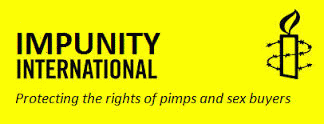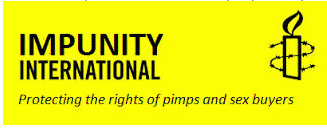| Back OpEd News | |||||||
|
Original Content at https://www.opednews.com/articles/Amnesty-International-Not-by-Janice-Raymond-International_Law_Perpetrators_Policy-150819-529.html (Note: You can view every article as one long page if you sign up as an Advocate Member, or higher). |
|||||||
August 19, 2015
Amnesty International: Not in Our Name
By Janice G. Raymond
On August 11, 2015, Amnesty International voted to decriminalize not only women in prostitution, but also their pimps and buyers. This was done in the name of protecting women. Amnesty has awarded a dignity to pimps and prostitution users they could get no place else. This article unmasks what poses as Amnesty's masquerade of protection for women in prostitution.
::::::::
The big word in Amnesty's defense of voting to decriminalize the sex industry is protection. All was done to protect the women in prostitution. We were told that the right to buy sex and the right to pimp are measures necessary to protect women in prostitution. In the lead up to the vote, the organization was offended by those who pointed out that its alleged objective of protecting women is a protection racket for pimps and prostitution users.
What poses as Amnesty's masquerade of protection for women in prostitution?
An alleged poverty program for poor women. It was Ken Roth, the director of Human Rights Watch, tweeting his support for Amnesty's proposal, who gave this game away. "Why deny poor women the option of voluntary sex work?" Ken joined the chorus of johns who spout a welfare narrative to justify their sexual exploitation by turning it into a virtue. As one john interviewed said, "These girls gotta eat, don't they? I'm putting bread on their plate. I'm making a contribution."
A policy initiated by the perpetrators who are beneficiaries. As journalist Julie Bindel first revealed, Amnesty took to heart the lobbying of Douglas Fox, co-founder of a UK escort agency, who claimed credit for Amnesty's draft policy. In 2008 as a member of Amnesty, Fox urged the organization not only to support "sex workers" by promoting full decriminalization but also pushed his associates in the sex industry to join the organization. "Getting Amnesty on side will be a huge boost to our morale... we need to pursue them mercilessly..." he said. Amnesty tried to distance itself from Fox arguing he was not a current member and had no input, but his fingerprints and those he represents were all over the policy.
A policy supported by "sex workers," but not by survivors of prostitution. Amnesty listened to only one group of women who claim to represent all women in prostitution -- those who call themselves sex workers -- and most media accounts never challenged this assertion.
There are two voices that claim the authority of experience. One voice -- survivors of prostitution and their allies -- maintain that prostitution is violence against women. Survivors assert that defending the rights of women in prostitution requires prosecuting their perpetrators including pimps and prostitution users, and decriminalizing the victims. This means providing women in prostitution not simply with safe-sex education but also with life alternatives.
The other voice -- sex workers -- is louder, commands more media presence, makes prostitution look sexy, and seems to enjoy more financial support. Those speaking as "sex workers" argue that protecting women means that women should be free to hire "managers," otherwise known as pimps, and that "clients," otherwise known as johns, buyers or prostitution users, should be protected from any legislation such as the Nordic model that makes them accountable for their use and abuse of prostituted women.
A policy that creates the impression that pimps and prostitution users are not only deprived of their rights but are also protectors of the human rights of women.
Throughout this year, Amnesty could hardly bring itself to utter the word "pimp" or "prostitution user." It was as if by avoiding these terms, Amnesty could transform these perpetrators overnight into legitimate managers, cordial clients and agents of all good things for women in prostitution.
When one of the world's most respected human rights groups maintains that punishing prostitution users "may amount to a violation of the right to privacy and undermine the rights to free expression and health," something is seriously wrong with their view of human rights. Siding with the view that penalizing the buyers drives prostitution underground, Amnesty claimed that women would be made to take bigger risks. What is underground? Indoor prostitution, the Internet? There is no evidence for this claim.
It's the prostitution industry, not any law penalizing the buyers, which forces women to take bigger risks. Buyers are a major part of that risk. Women in prostitution everywhere have to make choices, even endangering their lives when buyers are violent, controlling, and insist on no condoms or risky sexual practices.
A protection policy and a vote based on secrecy and closed doors. Amnesty allegedly promotes an open society based on transparency. From the get-go, however, outsiders were not privy to the actual policy or its various incarnations. Few outside the inner circle even knew what the final document contained and what specifically the delegates were voting for or against. And only Amnesty representatives know the contours of the internal debate, what country delegations voted yes or no, and the actual vote count. Amnesty has conducted itself as a closed society and with a secret ballot.
Amnesty ignored the diversity of opponents to its proposed policy of decriminalizing the sex industry. For example, when the Coalition Against Trafficking in Women (CATW) launched their petition on Change.org, social media was filled with attacks on the "privileged celebrities" signing who "know nothing about prostitution." The attacks disregarded the multiple signers representing international NGOs, anti-trafficking organizations, politicians, journalists, lawyers, service providers, women's crisis centers, policy makers, women's rights activists and survivors. Amnesty discounted the petition of hundreds of academics and researchers who have worked for years on policies and projects related to prostitution and trafficking in women. The organization also snubbed former President Jimmy Carter's own petition on Change.org, and his name was seldom mentioned on social media as an opponent of Amnesty's policy. And the survivors petition was made invisible.
Amnesty has given a gift to pimps and prostitution users and in doing so, it has become a major donor to some of the most violent scum of the earth. In its callous and flagrant disregard for survivors, Amnesty has corrupted its core mission -- to defend the rights of the most vulnerable. Amnesty has awarded a dignity to pimps and prostitution users they could get no place else. Amnesty has done this in the name of protecting women. Tell them "Not in our name!"
Authors Website: janiceraymond.com
Authors Bio:
Janice G. Raymond is Professor Emerita of Women's Studies and Medical Ethics at the University of Massachusetts in Amherst (USA). She has been Visiting Professor at the University of Linkoping in Sweden, Visiting Research Scholar at the Massachusetts Institute of Technology (MIT), and Lecturer at the State Institute for Islamic Studies (IAIN Sunan Kalijaga), Center for Women Studies, Yogyakarta, Indonesia.
A longtime feminist scholar/activist against violence against women and sexual exploitation, as well as against the medical abuse of women, Janice Raymond was Co-Executive Director of the Coalition Against Trafficking in Women (CATW) from 1994-2007 and is currently on its Board of Directors.
Under Raymond's leadership, CATW expanded its regional networks and partners in the Baltics, the Balkans, and Eastern Europe, and supported prevention of human trafficking projects in the Philippines, Venezuela, Mexico, Mali and the Republic of Georgia. CATW has also helped provide services for Nigerian women trafficked to Italy, trained police and judges in India and educated journalists in Albania.
Janice Raymond has been in the forefront of the campaign to get prostitution recognized as violence against women, encouraging governments to provide services and alternatives for women in prostitution and penalize the purchase of women and children for sexual activities. For her work, Raymond received the "International Woman Award" from the Zero Tolerance Trust in Scotland.
In 2000, she co-published one of the first studies on trafficking in the United States entitled, Sex Trafficking in the United States: Links Between International and Domestic Sex Industries. Following this study, she directed and co-authored a multi-country project in the Philippines, Indonesia, Thailand, Venezuela and the United States, entitled Women in the International Migration Process: Patterns, Profiles and Health Consequences of Sexual Exploitation.
Raymond has testified before the European Parliament on "The Impact of the Sex Industry in the EU," and before a subcommittee of the U.S. Congress on "The Ongoing Tragedy of International Slavery and Human Trafficking." Janice Raymond has also served as an expert witness to legal challenges promoting decriminalization of the sex industry.
Janice Raymond has published articles in the Guardian, the Christian Science Monitor, the Los Angeles Times, Truthdig, Portside, and OpEd News. Raymond is the author of six books and multiple articles, translated into several languages, on issues ranging from violence against women, women's health, feminist theory and bio-medicine. She has also published numerous articles on prostitution and sex trafficking. She lectures internationally on all these topics.
Her most recent book is Not a Choice, Not A Job: Exposing the Myths about Prostitution and the Global Sex Trade. Her website is janiceraymond.com

